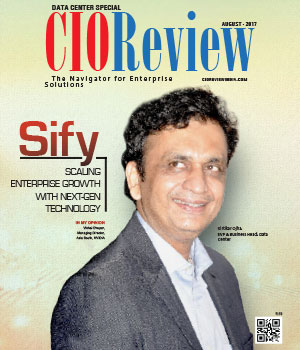
A Short Guide for Data-driven and Analytics-driven Businesses
Kapil Makhija, VP - Technology Cloud Business, Oracle India | Friday, 27 October 2023, 11:57 IST
 In an interaction with CIOTechoutlook magazine, Kapil discussed the role of cloud solutions in modern database management and highlighted the benefits of scalability and security.
In an interaction with CIOTechoutlook magazine, Kapil discussed the role of cloud solutions in modern database management and highlighted the benefits of scalability and security.
Having completed his engineering degree in Electronics and MBA in Marketing, Kapil boasts of an 18 years long career during which he has been associated with Oracle India for over 11 years now, prior to which he held the role of Regional Manager - Enterprise Business at Hewlett-Packard.
Share your thoughts on the database scenario lately in terms of how data is being handled, stored and optimized.
Data has become the lifeblood of any business. By harnessing the power of digital transformation and integrating it with the cloud, companies are now able to get meaningful insights into diverse facets of business and provide their customers with the best experience. Cloud solutions today have become more reliable, secure and efficient, thus offering greater scalability and improved security & performance. For example, greater scalability in the cloud database allows businesses to quickly adjust resources as per their needs. This flexibility is crucial for handling varying workloads today. Also, the improved global distribution capabilities enable data to be stored and accessed from various regions, improving latency and redundancy.
Hybrid and multi-cloud database solutions are allowing organizations to combine on-premises and multiple cloud providers seamlessly. Enhanced security features and compliance certifications make it easier for businesses to meet regulatory requirements and protect their data in the cloud. Data handling, storage, and optimization are all on-going processes that require careful planning, monitoring, and adaptation to changing business needs and data volumes. Integrating AI and ML have empowered businesses to leverage data more effectively, improve application performance, and streamline their operations. Organisations are trying to store rapidly growing quantities of data online as efficiently and cost-effectively as possible while meeting increasingly stringent regulatory and business requirements for data retention and protection.
Briefly explain the impact of data analytics on business optimization and enhancing customer experience.
Analytics permeates every aspect of our lives – in every function and division and allows businesses to make informed decisions. Today’s organizations face several challenges in becoming more data-driven such as siloed systems that create barriers to generating insights and increased costs. Performance issues across different toolsets and human bias in analysis can slow the decision-making process, leading to analytics taking a backseat to decision-making rather than being the driver. Traditionally, analytics was limited, human-driven, and labour-intensive, requiring specialised IT skills. It is no longer the case. With machine learning capabilities, users can leverage interactive self-service analytics for data preparation, visualisation, enterprise reporting, and augmented analysis. This allows customers to make intelligent, data-driven decisions that can propel the business forward.
With cyber-attacks at an all-time high today, what is your approach towards customer data protection?
We want our customers to take advantage of the cloud’s agility, flexibility, and scalability without compromising their or customers’ data. We follow a security-first approach, emphasising protecting customer data's confidentiality, integrity, and availability. To enable this, we weave security layers into all our cloud solutions at the architectural level, ensuring full-stack protection and a platform that’s secure by design. In an industry-wide initiative, we’ve recently collaborated with Applied Invention to design an open network and data security standard that will help organisations protect data in a distributed IT environment. The announcement was made at our flagship event – Oracle CloudWorld. The cybersecurity industry has produced many incremental changes and finds a definitive need to put a new fundamental approach allowing users to protect data in the increasingly complex cloud era. This is our effort to create an open, Zero-Trust Packet Routing (ZPR) standard that will help organisations prevent unauthorised access or use of their data without adding extra hurdles for legitimate activities.
Give us a brief comparison between a data-driven company and an analytics-driven company.
In today’s digital age where data is more abundant and accessible than ever before, being a data-driven company is significant. However, data-driven and analytics-driven are two different concepts. Being data-driven in a data analytics context means making informed business decisions from historical data analysis instead of relying solely on intuition, experience or assumption. On the other hand, being analytics-driven requires advanced analytics techniques embedded into day-to-day analytics to make more accurate, timely decisions. To have an edge in this modern analytics-driven culture, businesses must evolve beyond being data-driven.
Analytics-driven decision-making represents the next evolutionary step by leveraging data to drive business success. This evolution has been made possible partly by the advent of cloud computing. Overall, being analytics-driven represents a significant advancement to being data-driven to drive better business outcomes. The key to evolving from data-driven to analytics-driven is to embrace new analytics techniques from the right cloud-native analytics platform and continue to nurture a cultural shift that values fact-based decision-making. Businesses should invest in an analytics platform with embedded AI/ML capabilities that are cost-efficient and easy to use. Oracle is helping companies to be fully prepared for the data-driven economy. Our Oracle Analytics Cloud (OAC) combines data and machine learning to enhance human interactions, eliminate mundane tasks, reduce bias in analysis, and enrich decision-making and predictive ability. At Oracle CloudWorld, we announced new self-service AI-powered capabilities within Oracle Analytics Cloud. This includes generative AI assistants and augmented analytics for organisations to improve how data impacts decision-making.
CIO Viewpoint
India and its Data Center Advancements
By By Michael Cantor, CIO, Park Place Technologies
How AI/Machine Learning can Revamp Data Centers...
By Piyush Kumar Chowhan, CIO and Vice President, Arvind Lifestyle Brands Limited
By Sanjay Chowdhry, CIO, Hamdard WAKF Laboratories
CXO Insights
Why A Data First Approach Could Be Your...
By Geetha Ramamoorthi, Managing Director, India, KBR Inc
A Short Guide for Data-driven and...
By Kapil Makhija, VP - Technology Cloud Business, Oracle India
The burgeoning market of prompt engineering in...







